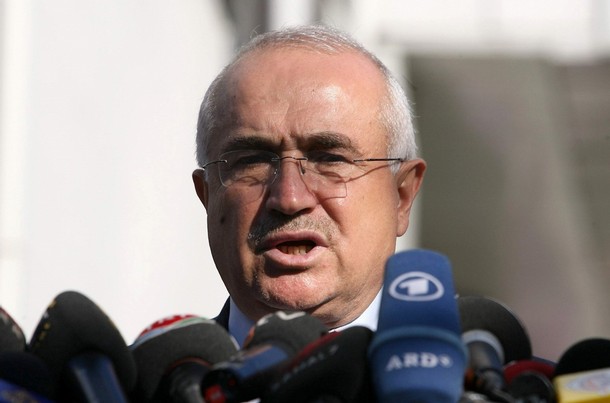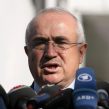
Turkish Judiciary Opposing the AKP Government
Publication: Eurasia Daily Monitor Volume: 6 Issue: 97
By:

Turkey’s ruling Justice and Development Party (AKP) has long been at loggerheads with the secularist establishment, including army generals, judges and academics. Since 2007 the judiciary has led the opposition against the AKP. The constitutional court attempted to shut down the AKP and ban the prime minister from politics. However, due to domestic and international pressure on the court, it ruled that the AKP had become the focal point for anti-secularist activities to transform the foundation of the Turkish state (www.haber7.com, July 30, 2008).
Since then, the Judges and Prosecutors Association (YARSAV), which is the first association formed by active duty judges and prosecutors in 2006, has criticized the AKP government. On almost every occasion that the chairman of YARSAV has held press conferences he has harshly criticized the government. YARSAV made its first public appearance after a closure case was filed against the ruling AKP. The evidence presented by the supreme court of appeals chief prosecutor Abdurrahman Yalcinkaya, was largely provided by YARSAV (Sunday’s Zaman, March 15, 2009). Due to its critical stance in the run-up to the closure case, Justice Minister Mehmet Ali Sahin made a harsh statement against the group, suggesting that YARSAV should change its name to YARSAP -the Judges and Prosecutors Party (Today’s Zaman, January 13).
When the AKP government revealed its plans to amend some articles in the constitution to conform with EU norms (Sabah, March 14) the heads of various courts fiercely resisted. On May 7, the head of the supreme court, Hasan Gerceker, stated that the planned amendments must not impair the secular foundation of the Turkish state (Hurriyet, May 7). The president of the council of state, judge Mustafa Birden, suggested that the "Turkish parliament has limited power to amend the constitution. Thus, the parliament cannot use its power to amend the articles that embody the spirit of the constitution. These amendments, which may erode the secular nature of the constitution will never be accepted" (Zaman, May 11).
The deputy prime minister, Cemil Cicek, said that the AKP had no intention of harming the spirit of the constitution, yet he stated that "the constitution is the biggest barrier for Turkey’s membership of the EU" (Yeni Safak, May 15 ).
As the latest example of judicial opposition to the AKP, the heavy penalty court in Ankara ruled that President Abdullah Gul must stand trial for fraud. Gul’s office rejected the court’s ruling, saying that the constitution only permitted the president to stand trial for treason. The fraud case itself dates back to the late 1990’s, when the Islamist Welfare Party, a predecessor to the AKP, was accused of misappropriating treasury funds. Former prime minister Necmettin Erbakan was found guilty five years ago in the same fraud case. Gul pardoned him last year (New York Times, May 18).
However, Gul’s presidential immunity from prosecution is ambiguous. He was a parliamentarian at the time the case was first considered, affording automatic immunity. Yet the constitution does not specifically grant this right to the office of president (Hurriyet, May 18).
In the court ruling Gul was labeled as a "suspect" in the fraud case. The decision came as a surprise, since it contradicted the prosecutor’s no-trial recommendation, and briefly triggered sales of Turkish bonds (Reuters, May 18).
It is unlikely that the court ruling will damage Gul. However, the move might further fuel animosity between the Islamist-rooted government and the secularist establishment. The AKP accused the court of being revisionist in terms of its previous rulings, and stated that Gul enjoyed the same immunity as parliamentarians (Aksam, May 20). The speaker of the parliament Koksal Toptan, an AKP parliamentarian himself, also stated that the president cannot be prosecuted (Anadolu Ajansi, May 18). The secularist opposition is attempting to use this opportunity to discredit the government. Indeed, the opposition Republican People’s Party issued a statement arguing that Gul has no immunity. Thus, in their opinion, he must stand trial for his alleged involvement in fraud (Anadolu Ajansi, May 18).
While the AKP questions the right of the court to prosecute the president, the former chairman of the constitution commission, AKP parliamentarian Burhan Kuzu, suggested that Gul will be acquitted (Hurriyet, May 18). The irony is that since the court system as a whole is being politicized, even if Gul decided to voluntarily stand trial, no-one can be certain that it will rule on the basis of the evidence and avoid a politically motivated judgment. It appears that it will require major reforms and some time to develop a democratic culture for Turkish judges to avoid acting politically on behalf of the secularist establishment.




